- Home
- News & Features
- News
- FY2019
- TOWARD TICAD 7: ‘Africa & Me’ Part 11 - Developing Health Systems to Provide Health Care and Health Insurance for All the Citizens of Senegal – Makoto Tobe, JICA Senior Advisor
News
August 26, 2019
TOWARD TICAD 7: ‘Africa & Me’ Part 11 - Developing Health Systems to Provide Health Care and Health Insurance for All the Citizens of Senegal – Makoto Tobe, JICA Senior Advisor
In the Republic of Senegal in Western Africa, JICA has been supporting the reform of the health financing systems. In 2013, Senegal developed a “Strategic Plan for Development of Universal Health Insurance,” with a goal of covering 90% of its population with health insurance by 2022. By expanding coverage of health insurance programs as well as improving health service delivery systems, Senegal aims to achieve Universal Health Coverage (UHC). “UHC” refers to the conditions whereby all the people can receive health care services of adequate quality when needed without suffering economic difficulties.
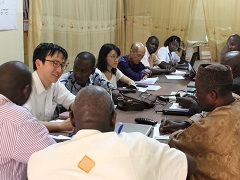 Tobe (second from left) interviewing representatives of departmental union of mutual health organizations in Kaolack Region, Senegal
Tobe (second from left) interviewing representatives of departmental union of mutual health organizations in Kaolack Region, Senegal
For the eleventh installment of the series, “TOWARD TICAD 7: ‘Africa & Me’,” Makoto Tobe, JICA Senior Advisor on Health Financing, talks about the importance of health financing systems for the attainment of UHC.
Simultaneous financial and technical assistance for health financing system
“In Senegal, which has a population of 15 million, the lives of 2 million people are endangered by extreme poverty. In order to achieve UHC, which the country is aiming at, significant problems had to be dealt with,” Tobe commented.
The annual premium per person of the community health insurance in Senegal is equivalent to 2,000 Japanese yen. In order for the government to subsidize the insurance premium of the 2 million people in the poorest segment of the population who are unable to pay the insurance premium by themselves, 4 billion yen would be required as an additional budget annually.
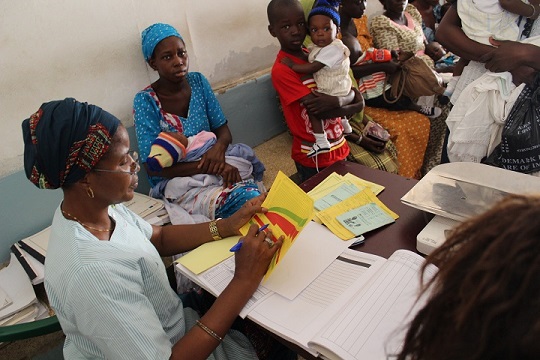 A midwife performing a growth monitoring of infants at a health center in Senegal. In order to provide health care services, health financing systems should provide sufficient financial resources to health centers.
A midwife performing a growth monitoring of infants at a health center in Senegal. In order to provide health care services, health financing systems should provide sufficient financial resources to health centers.
For this reason, the government of Senegal made a request for assistance to Japan, which has developed and maintained a universal health insurance system for more than 50 years, and which has provided technical assistance to strengthen the health system for several decades. In response to the requests, JICA decided to provide both financial and technical assistance for the health financing system simultaneously – a concessional yen loan of 8.4 billion yen, and a technical cooperation project to strengthen administrative skills of the health financing system at community, region and national levels.
“This is the first time that JICA has provided both financial and technical assistance simultaneously to strengthen a health financing system in Africa. In previous assistance in the health sector, priority was given not to health financing but to health service delivery such as health facility enhancement and human resource development for health with the intention of ‘Let’s improve the health services first.’ However, for the last ten years, it has become global common knowledge that assistance for health service delivery alone does not work and that health financing systems need to be strengthened, too. Even if health human resources are developed, they will not be employed unless there is a financial system to raise sufficient fund to pay for them. Also, funding is necessary to maintain health facilities and equipment. It has been recognized that it is important to develop a health financing system in order to raise sufficient funds for health through health insurance and taxes rather than over-relying on patients’ out-of-pocket payment.
A health financing system as a key to sustainable development
Tobe had an unforgettably disappointing experience in Cote d’Ivoire, where he fully realized the importance of the health financing system.
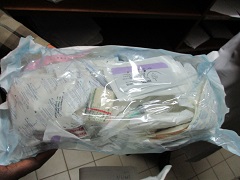 A delivery kit stored in a hospital warehouse in Cote d’Ivoire. These kits were originally intended to be provided to pregnant women free of charge but, in actual fact, the women have to pay for them. Making the health financing system reliable and sustainable is an important issue.
A delivery kit stored in a hospital warehouse in Cote d’Ivoire. These kits were originally intended to be provided to pregnant women free of charge but, in actual fact, the women have to pay for them. Making the health financing system reliable and sustainable is an important issue.
“One day, I went to observe a government-run hospital. It was dirty and unorganized, and smelled terribly. Many medical supplies were out of stock and health care workers were understaffed and exhausted. A pregnant woman bleeding heavily was brought in. The midwife on duty did not provide any care but just waited for the doctor to arrive. The pregnant woman eventually died. The technical skills of midwives obviously need improvement. But that’s not all. I realized that it is also necessary to establish a financing mechanism so that an appropriate budget can be allocated to procure sufficient supplies and to hire a sufficient number of midwives.”
In 1960, many colonies in Africa became independent one after another and, at that time when hopes for economic growth were at their highest, there was a system whereby all medical costs were covered by taxes and people did not have to pay for health care from their pockets. However, contrary to expectations, economic growth subsequently became sluggish and, in order to prevent the financial collapse of the governments, the level of public services was gradually reduced with the result that health care budgets were slashed and people were expected to pay for the services they received. Consequently, the people especially in the poorest segment of the population became unable to use the health care services.
“The problem became apparent in the middle of the first decade of the 21st century. As an increasing number of people were forced to pay for services, people, especially the poor, began to stay away from hospitals and clinics, ill health became widespread, the death rate increased, and it became difficult for countries to develop sustainably. A report by the World Health Organization brought this problem to the attention of the world in 2010, asserting the need of a health financing system that everyone, including poor and vulnerable people, can depend on.
Aiming at a peaceful world without inequity
Under JICA’s technical cooperation project on the health financing systems in Senegal, surveys were carried out into the population coverage of health insurance and free-care initiatives, the financial status of community-based health insurance organizations, and the proportion of out-of-pocket health expenditure over total household expenditure. Based on the results, recommendations are being provided as to how to improve existing health financing systems to adequately cover especially the poorest segment of the population.
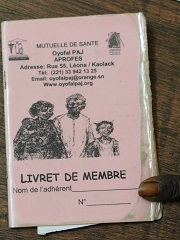 The membership booklet of community health insurance in Senegal. Currently, almost all administrative work of the insurance is managed by volunteers who were elected by community members.
The membership booklet of community health insurance in Senegal. Currently, almost all administrative work of the insurance is managed by volunteers who were elected by community members.
“One characteristic of the health insurance system in Senegal is that the administrative work of health insurance is carried out by community leaders and volunteers who are chosen by community members. In the future, professional staff should perform the administrative work, but current budgets are insufficient. I was struck by the spirit of self-help and the enthusiasm of ‘Let’s do what we can!‘ demonstrated by the people in the community.
In Japan, it took more than 30 years to achieve universal health insurance. It is expected that it would take several decades to achieve universal health insurance in Senegal.
“Not only in Senegal but throughout the world, there are people who are forced to live in an unfavorable environment that they cannot escape from merely by their own efforts. By improving administrative systems of the society, I believe that we should do our best to resolve the inequity. If ‘inequity’ makes the world unstable and unpeaceful, I think that UHC will lead to a stable and peaceful world.” There is power in the words of Tobe.
Profile
Makoto Tobe
Tobe has been providing technical advice on health financing to JICA as a senior advisor since 2015. He has engaged in implementation and research regarding UHC in developing countries for over 20 years. He was awarded the ODA Best Practice Awards in 2014 by Philippine’s government and the JICA President’s Award in 2017 for the health systems strengthening project in Cordillera Administrative Region in the Philippines. He was born in Chiba.
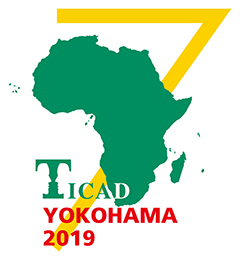
Related Link
- About JICA
- News & Features
- Countries & Regions
- Our Work
- Thematic Issues
- Types of Assistance
- Partnerships with Other Development Partners
- Climate Change / Environmental and Social Considerations
- Evaluations
- Compliance and Anti-corruption
- Science and Technology Cooperation on Global Issues
- Research
- JICA Development Studies Program / JICA Chair
- Support for the Acceptance of Foreign HRs / Multicultural and Inclusive Community
- Publications
- Investor Relations





